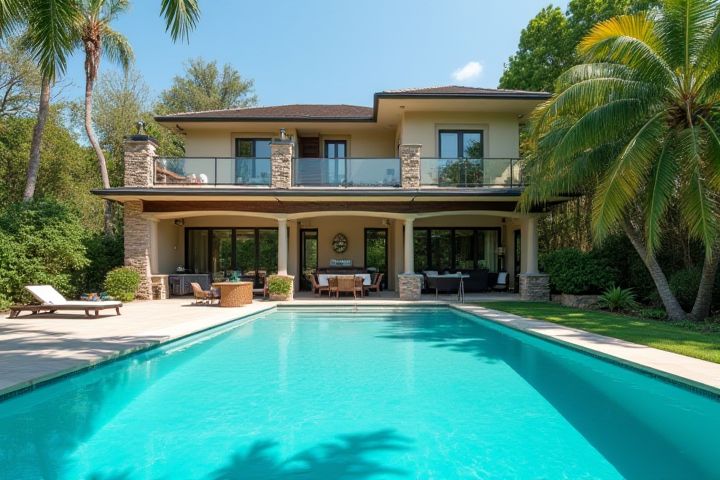
Owning a house with a pool can significantly enhance your lifestyle, offering a private oasis for relaxation and recreation. A pool can increase your property value, making it a desirable feature for future buyers, particularly in warm climates. Furthermore, having a pool encourages outdoor activities and gatherings, providing a perfect venue for family and friends. Consider the maintenance costs, including cleaning, chemicals, and potential repairs, which can impact your budget. If you enjoy swimming or entertaining, a pool can be an investment worth making, adding both enjoyment and aesthetic appeal to your home.
Should You Get A House With A Pool
Maintenance costs
Owning a house with a pool can add an average of $200 to $800 annually in maintenance costs. This figure includes routine expenses like chemical adjustments, cleaning, and equipment repairs, which typically account for 10-15% of the overall pool value. Your yearly budget should also consider water usage, which can increase utility bills by approximately 10-20%. Furthermore, if your pool requires resurfacing every 10-15 years, you might face an additional one-time expense ranging from $5,000 to $10,000 depending on the material used.
Increased insurance premiums
Owning a house with a pool can significantly raise your insurance premiums, often by 10% to 20% compared to similar homes without pools. This increase is due to the added liability risks associated with pool ownership, such as potential accidents or injuries. You might also need to purchase additional liability coverage, further impacting your overall insurance costs. Before deciding on a pool, carefully assess these financial implications and consult with your insurance provider to get accurate quotes.
Safety concerns
A house with a pool enhances your outdoor living experience, but safety should be a top priority, especially if you have children or pets. Statistics indicate that drowning is a leading cause of accidental death among children aged 1 to 4, highlighting the need for proper safety measures. Installing a secure pool fence that is at least 4 feet high and includes a self-latching gate can significantly reduce risks. Regular safety audits and teaching children water safety skills can further ensure a safe environment for everyone enjoying your pool.
Impact on property value
A house with a pool can significantly influence its market value, often increasing it by 7% to 15%, depending on the local real estate market. In regions with warmer climates, such as Florida or California, pools are highly sought after, potentially adding thousands to your home's appraisal. However, it is crucial to consider maintenance costs, as a well-kept pool may require an investment of $1,200 to $3,600 annually for upkeep and repairs. If you plan to sell, a pool may attract buyers looking for leisure amenities, thereby enhancing your property's appeal and resale potential.
Use and enjoyment
Owning a house with a pool significantly enhances your lifestyle, offering a perfect space for relaxation and recreation. In warmer climates, a private pool can increase your home's value by up to 7%, making it a worthwhile investment. Enjoyment can be maximized with features like outdoor seating and landscaping, transforming the area into a personal oasis for entertaining guests or family gatherings. Regular maintenance, including cleaning and chemical balancing, is essential to ensure your pool remains inviting and safe year-round.
Climate considerations
When considering a house with a pool, evaluate local climate conditions that influence pool usage and maintenance. In regions with high temperatures, a pool can offer significant relief during summer months, potentially enhancing your home's value by up to 15%. Conversely, in areas with colder climates, you might only utilize a pool a few months a year, leading to higher operational costs and reduced return on investment. Also, consider energy-efficient heating options and eco-friendly water management systems to mitigate environmental impacts and lower utility bills.
Community pool versus private pool
Choosing between a community pool and a private pool can significantly impact your lifestyle and property value. A private pool offers exclusive use and potential for increased home equity, often appraising higher in markets where pools are desirable, while maintaining your privacy. On the other hand, community pools foster social interactions and typically require less maintenance and ongoing expenses, appealing to those looking for a carefree lifestyle. Consider your priorities: if you value seclusion and can manage upkeep, a private pool may be right for you, whereas a community pool is ideal for those who prefer a vibrant, shared environment.
Space and design integration
Choosing a house with a pool can significantly enhance both your outdoor space and the overall design aesthetic of your property. With an average pool area costing between $30,000 to $60,000, it's essential to consider how the pool integrates with your home's architecture and landscape. Thoughtful design can create seamless transitions between indoor and outdoor areas, promoting a sense of openness and flow that can be especially appealing in regions with warm climates. Prioritizing space not only maximizes functionality but also elevates the lifestyle experience for you and your family.
Resale appeal
A pool can enhance your property's appeal, potentially increasing its resale value by 7% to 15%, depending on location and market trends. Homes with pools attract buyers seeking a lifestyle upgrade, particularly in warmer climates where outdoor entertaining is prioritized. Research indicates that 75% of homebuyers consider a pool as a desirable feature, making your home stand out in a competitive market. However, maintenance costs can be a concern for some buyers, so ensure your pool is well-maintained to maximize its appeal.
Local regulations and permits
Before purchasing a house with a pool, it's essential to understand local regulations and permit requirements, which can vary significantly by region. Many municipalities mandate safety features such as pool enclosures, alarms, and fencing, often adhering to standards set by local building codes. Typically, obtaining a pool permit may involve fees ranging from $100 to $500, depending on the complexity and the municipality's regulations. Ensure you conduct thorough research, as failing to comply with local laws could result in fines or forced alterations to your property.
